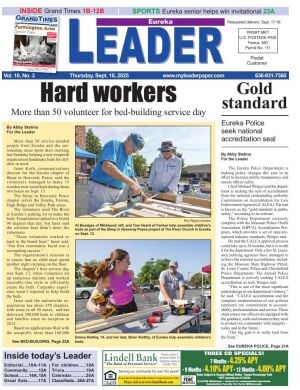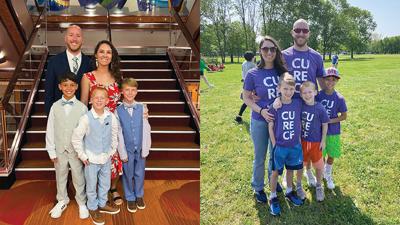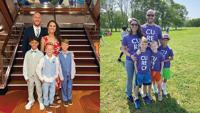Four-letter words generally get a bad rap, but I have a favorite I bet you’re fond of too: hope.
For Barnhart resident Jeremy Parks, 40, hope is a word with resounding meaning, as he lives a life he never dreamed he’d have.
“I wake up some days and think, ‘Is this real?’” Jeremy says. “It’s still crazy to me.”
Born in 1984, Jeremy was officially diagnosed with cystic fibrosis at age 2, but from the time of his birth, his parents were heartbreakingly convinced that Jeremy would suffer from the same disease that had taken their first child, daughter Krista, at age 8 months.
Cystic fibrosis is a genetic disorder that changes a vital protein in the body, causing a buildup of thick and sticky mucus, leading to infections, lung disease, and problems with breathing and digestion.
CF is thought to have originated around 3,000 BC, with symptoms noticed throughout history. But it wasn’t until 1938 that Dr. Dorothy Hansine Andersen gave cystic fibrosis its name and a reason for its existence: Victims had inherited a recessive gene, Andersen correctly surmised.
When Jeremy was born and throughout his childhood, CF was expected to cause decreasing quality of life and early death.
Despite this prognosis, Jeremy recalls a “pretty healthy” childhood and played soccer, basketball and baseball. But his “mild to moderate” CF still required his mother to give him frequent “chest physiotherapy.”
“I’d lay across her lap and she’d clap away (trying to dislodge the heavy mucus in his lungs),” Jeremy says.
In 2013, CF patients were offered a newly developed vest equipped with air hoses to force out mucus. Jeremy wore one for two hours a day as a way of life and was hospitalized a couple of times a year for “tune-ups,” he says, for heavy-duty antibiotic treatment to tackle his worsening condition. Other CF patients, nearing the end of their journeys, sought lung transplants to extend their lives.
Research was doing its best to treat symptoms, but getting to the root causes of CF remained elusive.
Until.
In 2012, the first “modulator” drug to treat cystic fibrosis won FDA approval, providing a means to tackle actual causes. Research continued to add more weapons, and in 2019, a three-drug combo – Trikafta – was developed, with astounding results, and more drugs have been added since.
Jeremy, who raises his hand for drug trials whenever possible, has had a front-row seat for what is now perceived as a miracle of modern medicine. For CF babies born in 2025, predicted life expectancy is 61 years old. For babies born from 2002-2006, that number was 36.
For Jeremy, the turnaround began in 2018, when he participated in a trial for Orkambi.
“They told me, you’re going to feel terrible for the first 24 to 36 hours. That’s the clean-out phase.”
He went through that ordeal, coughing up a lot of mucus.
“And then, someone flipped a switch. It just stopped,” he says.
Although that was seven years ago, you can still hear the awe in Jeremy’s voice.
“With Trikafta, it was even more so – monumental,” he says. “I don’t take any breathing medications, or wear a vest anymore. Because of scar tissue, my lung function is in the 60 percent range. I get winded a little quicker than others.”
But the advancements have been “life-changing,” Jeremy says.
He says he gets chills when he thinks about children born today with a CF diagnosis.
“That’s what is so awesome,” he said. These (modulator) drugs are approved for ages 2 and older, providing a way to get way ahead of the disease. Kids will be able to live lives without any major complications, normal lives.”
But the work is not done, Jeremy wants people to know.
CF has many variations and while 90 percent can be helped by the drugs Jeremy and others have taken, 10 percent of patients are still facing grim futures.
“For me and so many others, it’s been amazing,” Jeremy says. “I have the prospect of seeing my kids grow up and having grandkids someday.
“So many with CF don’t have that hope of the future. I want the same hope for them.”
Jeremy has given talks about CF in the health care community and participates in fundraising events put on by the Gateway Chapter of the Cystic Fibrosis Foundation.
All are welcome to lend a hand to the local effort, says Anna Kusnierkiewicz, associate executive director of the Gateway Chapter.
“Cystic fibrosis is an orphan disease, and does not receive federal funding,” she says. “Our community has helped make success possible by raising funds to invest in science and research.”
The work must continue, she says.
Check out the organization’s website for details about how to participate in events and other ways you can help: Gateway Chapter/Cystic Fibrosis Foundation.
Estimates from the foundation put the number of CF patients at about 800 in Missouri and 40,000 across America, and several times that worldwide.
Even before his health improved, Jeremy demonstrated he didn’t want his life to be a statistic, no matter how short it might be. He married his wife, Monica, and the couple chose to have a family. With help from in vitro fertilization (CF also affects fertility), they are raising three sons.
Jeremy, who gives Monica credit for helping him overcome his doubts about the future, studied to become a respiratory therapist, and worked with patients like himself for 11 years before going into BJC management at Barnes-Jewish Hospital in St. Louis.
He notes, with humor, there is a bit of a downside when it comes to his new lease on life.
Because of digestive problems, CF can make its victims very thin. Jeremy remembers being like that.
“Now, if I don’t watch what I eat, I can get overweight,” he says.
You know what? He’ll take it.




